Kerry joins nuclear talks as Iran, powers push for breakthrough
World powers compromise on Iran's 'right to enrich' uranium.
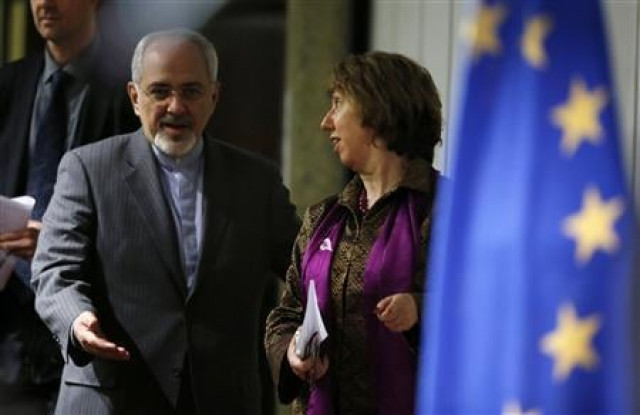
Iranian Foreign Minister Mohammad Javad Zarif (L) with European Union foreign policy chief Catherine Ashton (R) in Geneva. PHOTO:REUTERS/FILE
The Chinese, Russian, French, British and German foreign ministers - Wang Yi, Sergei Lavrov, Laurent Fabius, William Hague and Guido Westerwelle - all pulled up their sleeves to try to seal an interim deal under which Iran would cap its nuclear activity in exchange for limited relief from sanctions.
Hague and Westerwelle, however, both cautioned that a preliminary accord to turn the page on years of confrontation with Iran was not yet guaranteed and that there was much work to do to bridge remaining differences.
"We (foreign ministers) are not here because things are necessarily finished," Hague told reporters. "There is a huge amount of agreement...(But) the remaining gaps are important and we will be turning our attention to those over coming hours. They remain very difficult negotiations."
Diplomats earlier said a formidable sticking point in the intense negotiations, which began on Wednesday, may have been overcome with compromise language that does not explicitly recognise Iran's claim to a "right to enrich" uranium but acknowledges all countries' right to their own civilian nuclear energy.
But Russian Deputy Foreign Minister Sergei Ryabkov said Iran's demand to continue construction of a heavy-water reactor near Arak that could yield plutonium - an alternative bomb material - remained a tough outstanding issue.
Ryabkov said a breakthrough was closer now than at the November 7-9 round of Geneva talks but, he told Russia's Itar-Tass news agency, "unfortunately I can't say that there is a certainty of reaching that breakthrough."
"It's not a done deal. There's a realistic chance but there's a lot of work to do," Westerwelle told reporters.
Nuclear bomb risk
The powers' goal is to cap Iran's nuclear energy program, which has a history of evading UN inspections and investigations, to remove any risk of Tehran covertly refining uranium to a level suitable for bombs rather than electricity. Iranian authorities deny any agenda to "weaponise" enrichment.
"We are close to a deal but still differences over two-three issues remain," said Iranian Deputy Foreign Minister Abbar Araqchi, a senior negotiator.
An initial accord on confidence-building steps would be designed to launch a phased process of detente with Iran after decades of tense estrangement, and banish the specter of a devastating Middle East war over its nuclear aspirations.
A preliminary pact would run for six months while the powers and Tehran hammer out a broader, longer-term settlement.
Diplomacy revived dramatically after the landslide election of Hassan Rouhani, a relative moderate, as Iranian president in June, replacing bellicose nationalist Mahmoud Ahmadinejad.
Rouhani aims to relieve Iran's isolation by mending fences with big powers and getting sanctions lifted. He has obtained crucial public backing from clerical Supreme Leader Ayatollah Ali Khamenei, keeping powerful hardline critics at bay.
Talks at 'Final Moment'
The draft deal would have Iran suspend some sensitive nuclear activities, above all medium-level enrichment, in exchange for the release of some of many billions of dollars in Iranian funds frozen in foreign bank accounts, and renewed trade in precious metals, petrochemicals and aircraft parts.
The United States might also agree to relax pressure on other countries not to buy Iranian oil. Tehran has made clear it wants a more significant dilution of the sanctions blocking its oil exports and use of the international banking system.
France's Fabius, who objected to what he felt was a one-side offer to Iran floated at the November 7-9 negotiating round, seemed guarded on arrival in Geneva early on Saturday.
"I hope we can reach a deal, but a solid deal. I am here to work on that," he said. France has consistently taken a tough line over Iran's nuclear program, helping Paris cultivate closer ties with Tehran's adversaries in Israel and the Gulf.
Kerry left for Geneva "with the goal of continuing to help narrow the differences and move closer to an agreement," State Department spokeswoman Jen Psaki said. Direct US-Iranian engagement is crucial to a peaceful solution given the rupture in bilateral ties since Iran's Islamic Revolution in 1979.
Echoing optimism that a deal was close, China's state-run Xinhua news agency quoted a foreign ministry spokesman as saying the talks "have reached the final moment".
On the politically charged enrichment issue, Western powers say there is no such thing under the nuclear Non-Proliferation Treaty as a "right to enrich", but Iran has viewed this as a matter of national sovereignty and crucial to any deal.
Diplomats said revised wording on the table did not explicitly recognize a right to produce nuclear fuel by any country. "If you speak about the right to a peaceful nuclear program, that's open to interpretation," a diplomat said.
'Christmas present'
For the powers, an interim deal would mandate a halt to Iran's enrichment of uranium to a purity of 20 percent - a major technical step towards the bomb threshold, more sweeping UN nuclear inspections in Iran and an Arak reactor shutdown.
The OPEC producer rejects suspicions it is covertly trying to develop the means to produce nuclear weapons, saying it is stockpiling nuclear material for future atomic power plants.
Israel pursued a lobbying campaign against the offer of respite from sanctions for Iran, voicing its conviction that all this would achieve would be more time for Iran to master nuclear technology and amass potential bomb fuel.
Israeli Prime Minister Benjamin Netanyahu told local media in Moscow that Iran was essentially given an "unbelievable Christmas present - the capacity to maintain this (nuclear) breakout capability for practically no concessions at all."



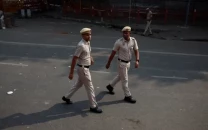
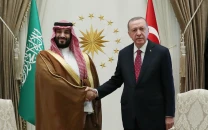
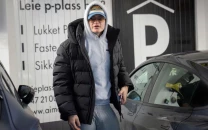
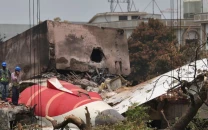












COMMENTS
Comments are moderated and generally will be posted if they are on-topic and not abusive.
For more information, please see our Comments FAQ